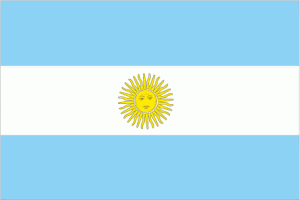 The Argentinean newspaper Página/12 reported on June 30 that the Argentine Senate unanimously approved the Public Production of Medicines Law. The law’s purpose is to promote access to medicines, vaccines and medical products, and to encourage the scientific and technological development through laboratories of public production (Art. 2). It declares the public research and production of medicines, medicinal raw materials, vaccines and medical products to be in the national interest (Art. 1).
The Argentinean newspaper Página/12 reported on June 30 that the Argentine Senate unanimously approved the Public Production of Medicines Law. The law’s purpose is to promote access to medicines, vaccines and medical products, and to encourage the scientific and technological development through laboratories of public production (Art. 2). It declares the public research and production of medicines, medicinal raw materials, vaccines and medical products to be in the national interest (Art. 1).
The Argentinean Ministry of Heath will be the authority in charge of the application of the law (Art.3). One of its objectives is to establish a register of laboratories for public production (Art. 6a). The public laboratories would have as a framework for production of medicines the WHO’s list of essential medicines (Art. 6b). Production would also take into consideration the epidemiological and seasonal profiles of the regions of the country (Art 6c). The public laboratories can enter into agreements with universities for quality control purposes, and the law includes provisions aimed at training people in production of medicines.
Article 6e aims to increase production of orphan medicines. As explained by Dr. Claudio Capuano, Director of the Universidad de Buenos Aires Medicine School Department of Health and Human Rights (and member of the Network of Public Laboratories, RELAP) medicines for orphan diseases are those for which the pharmaceutical industry does not produce treatment because it is considered not profitable, for instance the Chagas disease.
Article 6j promotes the development of active ingredients, specially using native species.
Senator José Cano explained to the Senate’s 6th Ordinary Session on June 29 [see pages 43-48 of the transcript] that the initiative establishes one of public health’s core values, the accessibility to the health system, in order to guarantee coverage and medicines to all the citizens of the country through the existing network[1] of 39 public production laboratories distributed in 12 provinces.[2] Senator Calcagno agreed, stating stated that “through this initiative we are giving a legal framework to the situation that already exists,” and stressed that the public production of medicines does not seek to displace private sector production.[3] For instance, private laboratories are not producing medicines for orphan diseases like Chagas, despite the social imperative to have medicines them.[4]
Brazilian as a role model in public production of medicines:
A June 26 story in the Argentinean paper La Prensa referred to the Brazilian experience in producing generic medicines: “within Latin America, besides Argentina, only Cuba, Mexico and Brazil produce medicines in the public sector. The latter is, as said by the coordinator of the department of Health and Human Rights of the UBA [University of Buenos Aires], Claudio Capuano, a role model, since in the last 10 years it has reached an important development in the public drug industry.” The article explains that in Brazil aims to produce drugs by through an alliance between the private sector and public enterprises, and to have the production of medicines for AIDS, Parkinson’s disease, rheumatoid arthritis and Crohn’s disease help to reduce the deficit of the trade balance in the pharmaceutical sector.
Original Sources:
- Pedro Lipcovich, for Página/12. Unanimidad en el Congreso para cortar por lo sano
- Honorable Senado de la Nación Argentina, Expediente numero: 3/11, available at http://www.senado.gov.ar/web/comisiones/verExpeComi.php?origen=CD&tipo=PL&numexp=3/11&nro_comision=&tConsulta=3
- Agustina Sucri, Cuando el Estado pone remedio, La Prensa, June 26, 2011, http://www.laprensa.com.ar/377098-Cuando-el-Estado-pone-remedio.note.aspx.
- Cámara de Senadores de la Nación [Senate of the Nation], Version Taquigráfica (Provisional), 8° Reunion, 6° Sesion Ordinaria [Provisional Transcript of the 8th Meeting, 6th Ordinary Session], June 29, 2011, page 43, available at http://www.senado.gov.ar/web/taqui/cuerpo1.php.
- La experiencia de Brasil [The experience of Brazil], La Prensa, June 26, 2011, http://www.laprensa.com.ar/377099-La-experiencia-de-Brasil.note.aspx
[1] “… A través de esta iniciativa se fija en materia de salud pública uno de sus valores fundamentales −la accesibilidad al sistema de salud−, a efectos de que todos los ciudadanos de nuestro país tengan garantizada la cobertura y la provisión de medicamentos mediante la estructura ya existente en nuestro país…”
[2] “… Al respecto, debo decir que hay aproximadamente 39 laboratorios de producción pública distribuidos en doce provincias…”
[3] “… la producción pública de medicamentos no busca desplazar al sector privado…”
[4] “hay muchos medicamentos huérfanos en donde los laboratorios privados, no porque sean malos sino porque es su índole, de repente, no le van a dar respuesta a esa demanda.
Pienso en el nifurtimox, por ejemplo, o en el benznidazol, NFT y BNZ –esto es más complicado que la economía–, que son medicamentos prácticamente huérfanos, muy difíciles de conseguir y que sirven para tratar ni más ni menos que la enfermedad de Chagas Mazza. Es decir que, precisamente, la enfermedad más social, donde la característica de la pobreza es imperante, es una que, quizás, no está en el eje de lo que es la actividad productiva comercial de medicamentos…”




